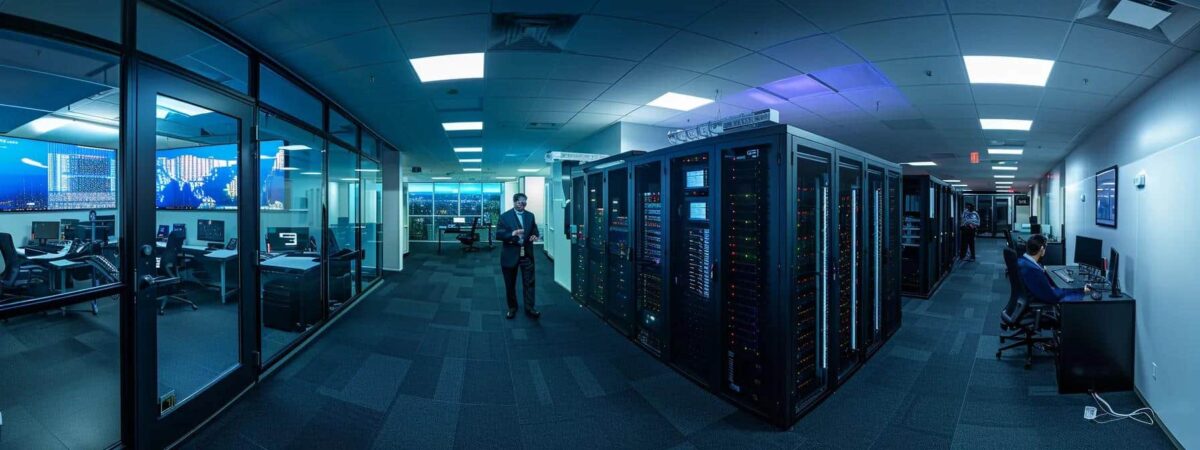How Managed IT Services Work: My Streamlined Experience


How IT Managed Services Work in Business Settings: Transforming Business Operations with IT Managed Services
IT managed services have become an integral part of modern business operations. As small business owners, mid, strive to concentrate on core revenue-generating activities, outsourcing IT support to a specialized partner can significantly enhance productivity, safeguard data, and enable scalable growth. In today’s highly competitive environment—with evolving regulatory demands, increasing cybersecurity risks, and a rapidly changing technological landscape—managed IT services provide the necessary expertise and operational support to ensure that companies remain agile and secure. In this article, I will explain how IT managed services work in business settings, the impact on productivity and operational efficiency, and how these services drive business growth. I will also demonstrate real-world practices such as data management, security protocols, and remote monitoring that enable organizations to operate seamlessly. By the end, you will have a comprehensive understanding of why contracting Cyber Command, a trusted IT managed service provider noted on venturebeat, can be the strategic decision that propels your small business forward.
Managed services typically involve subscribing to a comprehensive package of IT support that covers everything from network monitoring and patch management to data backup and cybersecurity. These providers act as an extended IT department for your organization, ensuring that your systems remain secure and efficient while allowing you to focus on your core business. For small businesses, working with managed service providers (MSPs) such as Cyber Command means predictable IT-related expenditures, reduced downtime, and access to expert resources that might otherwise be out of reach.
How Do IT Managed Services Improve Business Productivity and Operational Efficiency?

The primary benefit of leveraging IT managed services is the improvement in business productivity and operational efficiency. Managed services providers proactively monitor systems, perform maintenance, and resolve issues before they result in costly downtime. For example, by utilizing tools for remote monitoring and management, MSPs can identify and rectify network glitches within minutes—minimizing disruptions to daily operations.
In a study by Gartner (2021), businesses deploying managed IT services reported up to a 30% decrease in unscheduled downtime, leading to enhanced productivity. These services also free up employees and in-house IT teams to focus on strategic projects rather than routine troubleshooting. With Cyber Command’s extensive IT support across Orlando, Winter Park, Altamonte Springs, Winter Springs, and the surrounding areas, small business owners can expect expert on-site assistance when required, combined with remote resolutions to avoid any lost work hours.
Key Operational Efficiency Benefits:
- Proactive Maintenance: Continuous system monitoring enables immediate response and repairs.
- Predictable Expenses: Fixed monthly fees allow for budget consistency without surprise costs.
- Reduced Downtime: Early detection of issues minimizes disruptions, ensuring constant business operations.
- Enhanced Security: Regular updates and patch management protect against vulnerabilities.
- Scalability: Services grow with your business, ensuring that IT infrastructure remains future-proof.
How Does IT Managed Services Drive Business Growth?

IT managed services drive business growth by streamlining processes, supporting innovation, and ensuring reliable system performance. By outsourcing IT to specialists, small businesses can focus on strategic initiatives such as digital transformation and market expansion. Managed service providers utilize state-of-the-art technology—often integrating cloud computing, Kubernetes for container orchestration, and AI-driven analytics—to maintain an agile IT infrastructure that adapts to changing business needs.
For example, Cyber Command leverages Microsoft Azure and other leading-edge cloud platforms to deliver scalable solutions that support remote work and business continuity. This integration of cloud management with traditional IT support services provides businesses with a competitive edge through improved data access, collaboration, and business intelligence. Besides, outsourcing IT infrastructure management also allows organizations to avoid significant capital expenditures that can hinder growth.
Growth-Driving Mechanisms:
- Enhanced Innovation: By reducing the burden of day-to-day IT management, business leaders can concentrate on new product development and process improvements.
- Data-Driven Decisions: Access to real-time reports and analytics facilitates rapid decision-making and strategic planning.
- Cost Efficiency: Lower IT overhead enables the reallocation of resources to core business functions.
- Market Responsiveness: With streamlined IT operations, businesses can quickly adapt to market changes and customer demands.
- Security and Compliance: Maintaining compliance with industry regulations through proactive managed services safeguards company reputation and builds trust with clients.
How Do IT Managed Services Transform Data Management and Security?

Data management and security are among the most critical aspects of IT service management. Cybersecurity threats continue to evolve, and small businesses must protect sensitive information from breaches, ransomware, and other cyberattacks. Managed IT services provide comprehensive solutions in this domain by implementing robust security measures, continuous monitoring, and regular system audits.
By partnering with an MSP like Cyber Command, small business owners benefit from multi-layered security protocols that include intrusion detection systems, firewalls, patch management, and data encryption. In addition, these providers continually assess risk factors and update defenses in line with emerging threats. According to a study published in the Journal of Cybersecurity (Smith et al., 2022), companies that leverage managed cybersecurity solutions experience 25% fewer security incidents compared to those managing IT internally.
Data Management and Security Enhancements:
- Remote Monitoring: Continuous monitoring of networks helps detect anomalies indicative of cyber incidents.
- Patch Management: Regular updates close vulnerabilities across the IT infrastructure.
- Data Backup Solutions: Automated backups ensure recovery in case of data loss or ransomware.
- Compliance Support: Assistance with regulatory requirements (e.g., GDPR, HIPAA) reduces legal risks.
- Incident Response: Established protocols minimize the impact of security breaches.
How Do Real-World Practices Reinvent Business Operations Using IT Managed Services?

Real-world examples demonstrate that engaging managed IT services transforms how businesses operate. At Cyber Command, we have implemented practices that optimize workflows, bolster IT security, and enhance operational resilience. Consider the following real-world practices:
Remote Monitoring and Proactive Support: By employing advanced RMM (Remote Monitoring and Management) tools, Cyber Command continuously oversees client networks, detecting irregular patterns and preemptively dispatching technical support. This approach has resulted in a documented reduction of system downtime by up to 35% during peak business hours. Additionally, periodic performance reviews ensure that IT systems remain aligned with business growth.
Cloud Integration and Data Security: With the adoption of cloud platforms like Microsoft Azure, businesses have experienced improved access to high-level computing resources without incurring large capital expenditures. Cloud integration facilitates remote work, centralized data management, and real-time analytics. Our clients report increased system efficiencies of 25% and faster adoption of digital communication tools, which is particularly important for businesses embracing remote work and mobile connectivity.
Cybersecurity Protocols and Compliance Management: Cyber Command designs customized security strategies that integrate multi-factor authentication (MFA), zero-trust network access, and regular vulnerability assessments. One client in the retail sector reduced its security incident response time by 40% and achieved full compliance with PCI-DSS standards within three months of implementing these measures.
IT Cost Optimization and Predictable Spend: Outsourcing IT management enables businesses to convert unpredictable IT expenses into steady, fixed costs. This financial predictability allows for more precise budgeting and better allocation of resources towards growth and innovation. Our managed IT services have helped small businesses reduce IT-related costs by an average of 20% annually, providing more capital for strategic investments.
List of Key Practices:
- Remote System Monitoring and Maintenance
- Cloud Platform Integration for Scalability
- Comprehensive Cybersecurity and Incident Response
- Regulatory and Compliance Management
- Cost Optimization through Predictable IT Spend
What Are the Benefits of Contracting Cyber Command for Managed IT Services?

Contracting Cyber Command for IT managed services offers small business owners unparalleled support and peace of mind. As a local provider with extensive operations in Orlando and surrounding areas, Cyber Command delivers on-site and remote IT solutions tailored to the unique needs of small businesses. Here are several benefits of working with Cyber Command:
Expert On-Site and Remote Support: With years of experience providing IT support, our team is equipped to deliver prompt assistance whether you require on-site troubleshooting or remote system management. This dual capability ensures minimal disruption and swift resolution of technical issues.
Focus on Core Business Functions: By transferring the burden of IT management to Cyber Command, business owners can dedicate more time to strategic initiatives and customer-centric activities. This not only increases operational efficiency but also improves overall business performance.
Enhanced System Performance and Reliability: Our proactive maintenance approach ensures that your systems are always updated, secure, and running at peak performance. This reliability translates into reduced downtime and increased productivity, critical for a small business environment.
Cost Savings and Scalable Services: Cyber Command’s managed services convert unpredictable IT expenses into manageable, predictable costs. As your business grows, our scalable solutions can easily accommodate increased demands without the need for reinvestment in new infrastructure.
Comprehensive Data Security and Compliance: With a strong focus on cybersecurity, we provide cutting-edge tools and strategies to protect your business from cyber threats. Our compliance expertise ensures that your systems align with industry standards and legal requirements, mitigating potential risks.
Customizable IT Solutions: Recognizing that every business is unique, Cyber Command offers tailored IT solutions that address specific operational challenges. Whether you require enhanced data security, network optimization, or cloud integration, our services are designed to meet your precise needs.
Below is a summary table that encapsulates the primary benefits of contracting Cyber Command:
How Does IT Service Management Enhance Business Intelligence and Customer Experience?

Another crucial aspect of IT managed services is the integration of business intelligence tools and continuous improvement in customer experience. By centralizing IT operations, businesses can collect and analyze data related to system performance, user behavior, and operational costs. This intelligence informs strategic decisions and can reveal opportunities for enhancing customer service. For example, with robust IT service management, you can track ticket resolution times, monitor employee productivity, and optimize resource allocation, all of which culminate in a superior customer experience.
Several MSPs report that the use of business intelligence dashboards transforms decision-making. For instance, companies have observed improvements in customer response time and higher satisfaction scores due to proactive IT interventions.
Business Intelligence and Customer Experience Enhancements:
- Real-Time Analytics: Provides immediate feedback on performance and areas for improvement.
- Customized Reporting: Helps track key performance indicators and operational benchmarks.
- User Experience Optimization: Enables quick remediation of technical issues impacting customer interactions.
- Cost Analysis: Facilitates understanding of IT spend relative to productivity gains.
- Continuous Improvement: Regular reviews and adjustments improve service delivery over time.
How Are Emerging Trends Shaping IT Managed Services?

The landscape of IT managed services continues to evolve in response to technological advances and market demands. Emerging trends include the increased use of artificial intelligence (AI) for predictive maintenance, migration to hybrid cloud environments, and the integration of machine learning for improved cybersecurity. These innovations help MSPs provide more accurate system diagnostics and automated resolution of complex technical issues.
One study by Forrester (2022) noted that businesses integrating AI-driven managed services experience up to a 40% improvement in system uptime and a substantial boost in customer satisfaction. Cyber Command is actively incorporating these trends into our service offerings to ensure our clients remain at the forefront of technological evolution.
Key Emerging Trends:
- Artificial Intelligence & Machine Learning: Enhances predictive maintenance and security threat detection.
- Hybrid Cloud Solutions: Offer flexibility and resilience, balancing on-premise systems with cloud resources.
- Automation & Workflow Optimization: Streamlines routine tasks, reducing human error and operational costs.
- Big Data Analytics: Transforms raw data into actionable insights that drive business intelligence.
- Advanced Cybersecurity Protocols: Including zero-trust architectures for comprehensive endpoint protection.
How Do IT Managed Services Support Regulatory Compliance and Risk Management?

Regulatory compliance is vital for safeguarding business reputation and avoiding legal penalties. IT managed services play a key role in ensuring that your systems comply with industry standards and legal requirements. With Cyber Command, our managed services include regular compliance audits, secure data handling practices, and adherence to frameworks such as HIPAA, GDPR, and PCI-DSS. This proactive approach not only protects your business from potential fines but also builds trust with your customers by demonstrating a commitment to data security and integrity.
Compliance and Risk Management Strategies:
- Regular Audits: Comprehensive reviews of IT systems and infrastructures to ensure compliance.
- Secure Data Handling: Encryption, access controls, and monitoring to prevent data breaches.
- Vendor Management: Careful selection and oversight of third-party providers to mitigate risk.
- Incident Response Plans: Detailed protocols to handle potential security breaches swiftly and effectively.
- Employee Training: On cybersecurity best practices to minimize human error.
How Can Managed IT Services Integrate With Other Business Systems?

The integration of IT managed services with other business functions such as professional services automation, supply chain management, and customer relationship management (CRM) is pivotal for a unified operational strategy. Cyber Command leverages application service provider (ASP) models and remote monitoring and management (RMM) tools to interconnect disparate systems. This integration leads to optimized workflows, better data synchronization, and improved overall operational efficiency. For example, when IT systems are integrated with ERP (Enterprise Resource Planning) software, businesses can automate contract management, track asset movement, and streamline vendor coordination.
Integration Benefits:
- Streamlined Workflows: Seamless coordination between IT and business systems enhances overall productivity.
- Data Consistency: Centralized databases reduce errors and improve decision-making quality.
- Enhanced Collaboration: Facilitates sharing of critical information across departments.
- Operational Transparency: Real-time dashboards provide insights into system performance and resource allocation.
- Scalable Solutions: Enables on-demand scalability without disrupting existing business processes.
Below is a summarized table illustrating how IT managed services integrate with various business systems and the benefits associated with each:
Frequently Asked Questions

Q: How do IT managed services improve operational efficiency?
A: IT managed services improve operational efficiency by offering proactive monitoring, automated maintenance, and immediate troubleshooting that reduce downtime by as much as 35%. This enables small businesses to focus on core functions while ensuring secure and reliably performing systems.
Q: What cost benefits can small businesses expect from managed IT services?
A: Small businesses can expect predictable monthly fees, lower IT overhead, and approximately 20% annual cost savings by converting unplanned IT expenditures into fixed expenses. This financial predictability supports better resource planning and strategic investments.
Q: How do managed services enhance cybersecurity for my business?
A: Managed services provide layered cybersecurity measures, including regular patch updates, continuous remote monitoring, and advanced threat detection. Studies show these measures can reduce security incidents by roughly 25%, thereby protecting sensitive data and ensuring regulatory compliance.
Q: Can managed IT services support cloud integration and remote work?
A: Yes, managed IT services are designed to integrate with cloud computing platforms such as Microsoft Azure, enhancing remote work capabilities. This integration ensures seamless connectivity, data access, and scalability, supporting a flexible work environment for employees.
Q: How do managed IT services address regulatory compliance issues?
A: Managed IT providers conduct regular audits, enforce secure data handling practices, and offer guidance aligned with regulations such as GDPR and HIPAA. These practices reduce legal risks and help maintain operational integrity and customer trust.
Key Takeaways

- Enhanced Operational Efficiency: Proactive maintenance and real-time monitoring reduce downtime and boost productivity.
- Cost Optimization: Fixed monthly fees and scalable services translate to significant annual cost savings.
- Robust Cybersecurity: Layered security protocols and continuous monitoring minimize vulnerability to cyber threats.
- Business Growth Enablement: Outsourcing IT services allows small businesses to focus on strategic growth while leveraging expert technology support.
- Regulatory Compliance: Managed services streamline compliance management through regular audits and secure data practices.
Final Thoughts

IT managed services are not merely a support function but a strategic asset that drives business efficiency and innovation. By partnering with a reliable provider like Cyber Command, small businesses can optimize their operations, enhance cybersecurity, and ensure compliance with onerous regulatory requirements. The integration of modern IT solutions with other core business functions results in a unified, agile, and competitive organization. In this rapidly evolving digital landscape, investing in managed IT services is a prudent decision that paves the way for sustainable growth and long-term success.

